Related Research Articles

The Territory of Wisconsin was an organized and incorporated territory of the United States that existed from July 3, 1836, until May 29, 1848, when an eastern portion of the territory was admitted to the Union as the State of Wisconsin. Belmont was initially chosen as the capital of the territory. In 1837, the territorial legislature met in Burlington, just north of the Skunk River on the Mississippi, which became part of the Iowa Territory in 1838. In that year, 1838, the territorial capital of Wisconsin was moved to Madison.

The 1808–09 United States House of Representatives elections were held on various dates in various states between April 26, 1808 and May 5, 1809. Each state set its own date for its elections to the House of Representatives before the first session of the 11th United States Congress convened on May 22, 1809. They coincided with James Madison being elected as president. Elections were held for all 142 seats, representing 17 states.
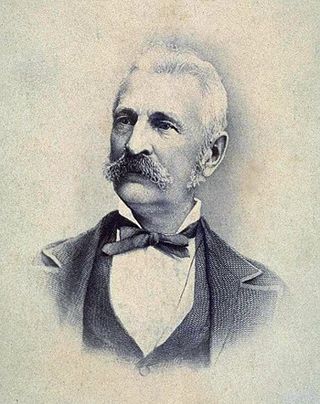
Serranus Clinton Hastings was an American politician, rancher and lawyer in California. He studied law as a young man and moved to the Iowa District in 1837 to open a law office. Iowa became a territory a year later, and he was elected a member of the House of Representatives of the Iowa Territorial General Assembly. When the territory became the state of Iowa in 1846, he won an election to represent the state in the United States House of Representatives. After his term ended, he became Chief Justice of the Iowa Supreme Court.
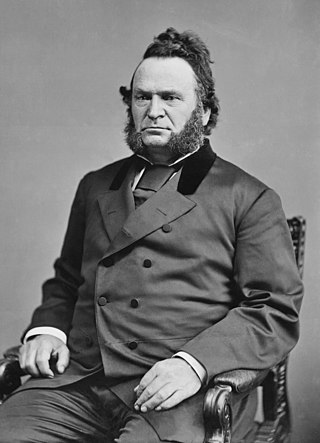
James Willis Nesmith was an American politician and lawyer from Oregon. Born in New Brunswick to American parents, he grew up in New Hampshire and Maine. A Democrat, he moved to Oregon Country in 1843 where he entered politics as a judge, a legislator in the Provisional Government of Oregon, a United States Marshal, and after statehood a United States senator and Representative.

William Vandever was a United States representative from Iowa and later from California, and a general in the Union Army during the American Civil War.

William W. Morrow was a United States representative from California, a United States district judge of the United States District Court for the Northern District of California and a United States circuit judge of the United States Court of Appeals for the Ninth Circuit and the United States Circuit Courts for the Ninth Circuit.

William Penn Wolf was a nineteenth-century politician, lawyer and judge from Iowa.

Aylett Rains Cotton was an American politician, lawyer, judge, educator and miner active in Iowa and Northern California.

Benjamin Todd Frederick was an American miner, businessman, real estate agent and politician. After winning the Democratic nomination for the 1884 elections in Iowa's 5th congressional district, he was elected for one term (1885–1887) to the United States House of Representatives.
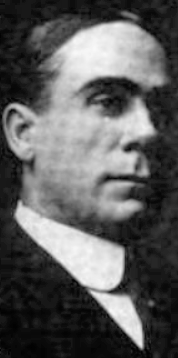
Charles Augustus Kennedy was a seven-term Republican U.S. Representative from Iowa's 1st congressional district in southeastern Iowa.

Gilbert Nelson Haugen was a seventeen-term Republican U.S. Representative from Iowa's 4th congressional district, then located in northeastern Iowa. For nearly five years, he was the longest-serving member of the House. Born before the American Civil War, and first elected to Congress in the 19th century, Haugen served until his defeat in the 1932 Franklin D. Roosevelt landslide.

John Nicholas William Rumple was a one-term Republican U.S. Representative from Iowa's 2nd congressional district.

Lot Thomas was a state-court judge who also served three terms as a Republican U.S. Representative from Iowa's now-obsolete 11th congressional district, in northwestern Iowa.
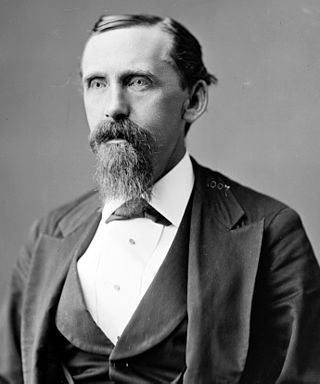
Lucien Lester Ainsworth was a one-term Democratic U.S. Representative from Iowa's 3rd congressional district in northeastern Iowa.
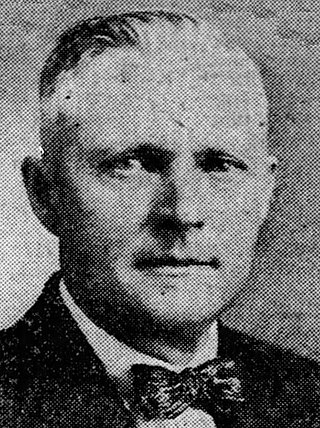
Charles Isaac Sparks was a U.S. Representative from Kansas.
Harry Elsworth Narey was a Republican U.S. Representative from Iowa for several weeks between the 1942 general election and the commencement of the 1943-44 (78th) Congress. He was the last Congressman to serve in Iowa's 9th congressional district. He completed his career as a state trial court judge.
Iowa's 8th congressional district existed from 1873 to 1963. The district was configured five times. Although the district encompassed four different areas of Iowa in its ninety-year existence, it was always predominantly rural, and elected a Republican lawyer to the United States House of Representatives in all but one of 46 elections.
Robert C. Arnould is an American former politician. He was first seated as a member of Iowa House of Representatives from District 82 from 1977 to 1983, then represented District 42 until 1993. Arnould served his ninth and final term as state representative for District 44.

In the 1885 Iowa State Senate elections Iowa voters elected state senators to serve in the twenty-first Iowa General Assembly. Elections were held in 24 of the state senate's 50 districts. State senators serve four-year terms in the Iowa State Senate.
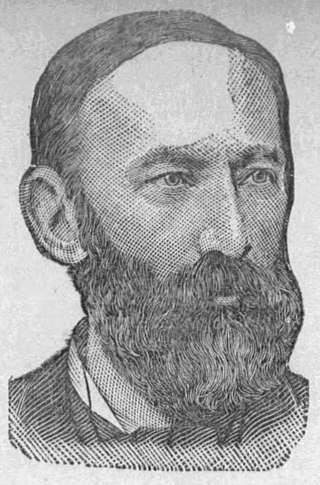
John Henry Keatley was an American newspaper editor, politician, and judge.
References
- ↑ "Senator Charles Paulk". Iowa General Assembly. Retrieved 9 June 2022.